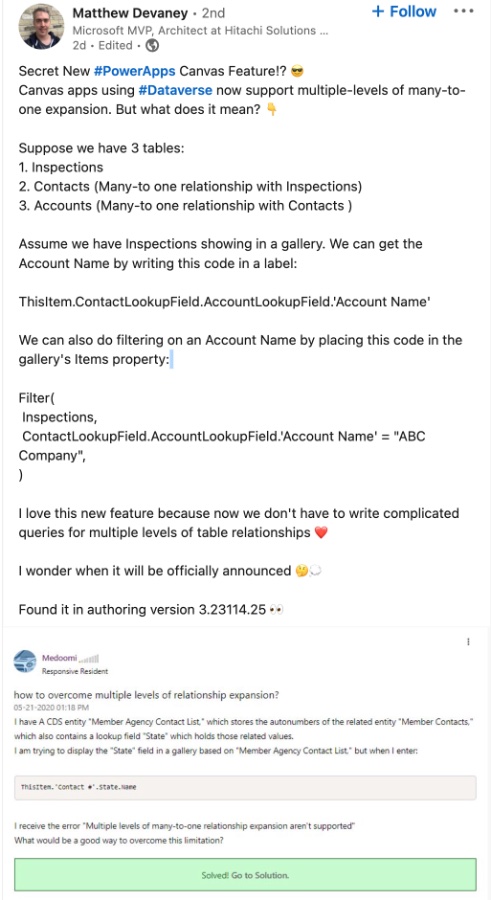
Canvas apps using Dataverse now support multiple-levels of many-to-one expansion.
We can also do filtering on an Account Name by placing this code in the gallery's Items property
Understanding the New Feature in PowerApps Canvas with Dataverse: Multi-Level Many-to-One Expansion
The new feature you've described in PowerApps Canvas, using Dataverse, is indeed an exciting development! Let's break down what this feature means and why it's beneficial.
With the traditional one-to-many relationships in databases, you would have tables linked where one record in a table (e.g., Contacts) can be associated with multiple records in another table (e.g., Inspections). Previously, accessing data from a related table, especially when dealing with multiple levels of relationships (like Inspections to Contacts to Accounts), could become complex, requiring intricate queries or additional steps.
This new feature in PowerApps Canvas simplifies accessing data across related tables. Here's how it works:
- Multi-Level Expansion: You can now easily retrieve data from related tables, even if the relationships are several layers deep. For example, from Inspections to Contacts, and then to Accounts.
- Simplified Syntax: The code you provided,
ThisItem.ContactLookupField.AccountLookupField.'Account Name', demonstrates how you can directly access the Account Name associated with an Inspection through the Contact. This approach is much more straightforward compared to writing complex nested queries. - Enhanced Filtering: Similarly, the ability to filter data based on related table fields, as shown in your gallery's Items property example, is a significant time-saver. It enables more intuitive and powerful data manipulation directly within the app.
This new feature enhances the user experience by simplifying data access and manipulation in multi-layered table relationships. It's a great improvement for app developers who use PowerApps Canvas with Dataverse, reducing the complexity of queries and making it easier to create dynamic and data-rich applications.
Regarding the official announcement, it's not uncommon for features to be available in authoring versions before their formal release. Keep an eye on official PowerApps and Microsoft updates for the announcement.
Overall, this feature represents a significant step forward in simplifying app development within the PowerApps ecosystem, especially for complex data relationships.
